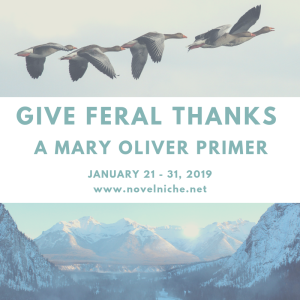
Willa Cather says, “The heart of another is a dark forest, always, no matter how close it has been to one’s own.” What might strike some as an inscrutable terror – how dare we be denied ultimate knowledge of our most intimate? – is an occasion for joy in Mary Oliver’s “The Whistler”.
The scene is tender, domestic, everyday: the speaker is reading in the upstairs bedroom, and their companion, who is downstairs, bursts into a twittering of unexpected whistles. No one is more surprised than the speaker. “It was thrilling. At first I wondered, who was / in the house, what stranger?”
The quality of the companion’s birdsong is key to understanding the speaker’s response. We hear this whistling as if from “a wild and / cheerful bird, not caught but visiting”: what could be more precious code than this, for the truth of human-to-human cleaving? Not caught, but visiting. Perhaps we are happiest when we are forever in the process of visiting each other, liberally and with boundless, urgent affection. There is such an unshackled wisdom in learning you can never fully know another, not even a lover, not even a mother. It doesn’t scare our speaker. No, in fact, they listen long, because it is “finally”, some time after, when they ask, “Is that you? Is that you whistling?”
We are treated to interlocking delights in “The Whistler”. First, there is the speaker’s rapturous wow, upon hearing this companionate whistling for the first time. Secondly, we witness the companion’s own thanks, at rediscovering what she’d forgotten she could do:
“I used to whistle, a long time ago. Now I see I can
still whistle. And cadence after cadence she strolled
through the house, whistling.”
There is no hint of accusation here, no sense that one partner has denied the other a vital emotional lock, to stuff into a locket. Nothing has been concealed, and nothing is to be regretted. As in “Wild Geese” and “The Fish”, there is a gentle pedagogy here: keep yourself open to a total wilderness of unknowing. Recognize you can only ever know someone, anyone, so much, and that there’s joy in the forever-promise of discovering them anew.
You could read the last stanza of the poem as a turn toward the darkly contemplative: “do we even begin / to know each other? Who is this I’ve been living with / for thirty years?” There’s a reason it’s a rom-com trope, right, the guy or girl or un/other-gendered protagonist sitting at the bar, shirtsleeves dismally crumpled, knocking back another amber tumbler of liquid, dryly moaning, “I’m just saying, you think you know someone after xx years? And then. And then…”
Call me rose-tinted, but I just don’t read the ending of “The Whistler” that way. To read it like that, I’d have to believe that Oliver intends “dark” and “lovely” to be opposite states, and I don’t. The dark is often fodder for our nightmares, our skeletal fears, but this poem is a reminder of darkness as resurrection, as rebirth. It’s in the clear, dark beauty of their companion’s whistle that a true revealing opens for the speaker. This is resurrection: a coming to life of an energy, an ability, that the companion herself thought long dead.
“Elbow and ankle- / Mood and desire. Anguish and frolic.” These have been the stations of desire at which the speaker (who we might think of as *the listener*, here) has worshipped their lifelong betrothed. These are the stopping places by which they imagined their mapping complete. Isn’t it thrilling, then, to learn the map has secret places? To learn, and to accept, that no cartography we make of another can ever be complete? There’s freedom, in that, and humility, too. There’s the making of enough room in our houses of commingling awareness and unknowing, to hum a merry tune.

Give Feral Thanks: A Mary Oliver Primer runs from January 21st – 31st.


